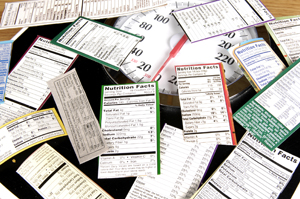
An easy way to recognize if a food is clean is by heeding the aphorism: “If man made it, do not eat it.”
by Cary Bailen —
In a nation where obesity has become an epidemic, it is no wonder that people are more concerned than ever about health and wellness. Americans spend $40 billion a year on weight-loss programs and products. Everywhere we look there is a new diet or magic pill on the market guaranteed to work better than the last one. It can be all too confusing and overwhelming, not to mention the question of whether they are evenhealthy or safe.
The old saying, “There are many ways to skin a cat,” could apply to this marketing phenomenon. Many of the diets out there can actually help you lose weight — but at what cost to your overall health? It is paramount that you gather as much information as you can before embarking on a new regimen.
Pay particular attention to what you ingest. While some diets can be successful in taking the weight off, they might also include chemicals that, in the long term, can wreak havoc on your body.
Our bodies are very wise and protective. They actually do not recognize many of the chemicals found in our foods today, such as partially hydrogenated oils, which get stored in our fat to protect the internal organs.
The chemically distorted trans-fatty acid molecule has an extremely odd shape and does not fit into the pattern of human biochemistry. Its presence disrupts the natural flow in our bodies — like trying to shove a square peg into a round hole. Eating a clean diet is a great way to ensure health and shed unwanted weight.
You may wonder what constitutes clean eating. In a nutshell, it is the practice of eating whole, natural foods, such as fruits, vegetables, lean proteins and complex carbohydrates. An easy way to recognize if a food is clean is by heeding the aphorism: “If man made it, do not eat it.”
Although it is paramount that we stay within a healthy weight range for a variety of reasons, it is also important to eat clean foods and protect our bodies from having to fight the many indigestible chemicals that are found in the standard American diet.
How did these chemicals get into our foods?
Chemicals become present in our food in a number of ways. Some of them include:
- Contaminants are widespread in our environment, and may enter the food chain and be present in all plant and animal products that we consume (e.g. dioxins).
- Chemical components of materials which come into contact with food, such as packaging materials, may be absorbed into our foods.
- Chemicals may form during food processing or cooking (e.g., polycyclic aromatic hydrocarbons).
- Chemicals used in farming, such as pesticides and veterinary medicines, may remain in the products we eat.
- Additives are deliberately added to food in order to provide some useful purpose, such as flavors and preservatives, which allow the consumer to select a varied diet from foods all year round.
What is so bad about processed foods?
Processed foods may taste good and be convenient, but when you become aware of what they actually do to your body, you might choose differently. Let us look at MSG, for example. MSG is an excitotoxin, which means that it overexcites your cells to the point of damage, acting as a poison and creating apparent “explosions” in the cells of the brain. The cells are damaged quickly upon consumption of MSG — not slowly over a long period of time. MSG has been linked to multiple sclerosis, Alzheimer’s and Lou Gehrig’s disease. The list goes on and on of processed foods and their link to poor health.
How to eat clean
- Eat mostly organic, if possible
- Eliminate refined sugar
- Eliminate processed foods (most packaged foods)
- Cook healthy meals
- Make healthy choices when dining out
- Drink a lot of water
- Consume a variety of fresh vegetables and fruit every day
- Eliminate alcoholic beverages (or significantly limit the amount)
- Avoid preservatives and additives such as: aspartame, BHA and BHT, MSG
- Use oils rich in omega-6 and omega-3 essential fatty acids. These are best consumed in a ratio of about 3:1 — three omega-6 for one omega-3.
Try to keep your ultimate goal in mind. Is it to lose 15 pounds at any cost or is it to take total control of your health by eating a clean diet and reaping the benefits of a lean, healthy body? Although it may seem like overload to live a healthier lifestyle while trying to lose weight, remember you do not need to have it all figured out all at once. Each day and each minute provides a new opportunity to make a choice toward improving your overall health.
Cary Bailen is president of Kidz for Life, Inc. 602-751-0012, cary@kidzforlife.com or www.kidzforlife.com.
AzNetNews, February 2010





August 14, 2012
Alzheimer's and Dementia, Environment, Food, Nutrition and Diet, Genetically modified, Healing, Weight issues